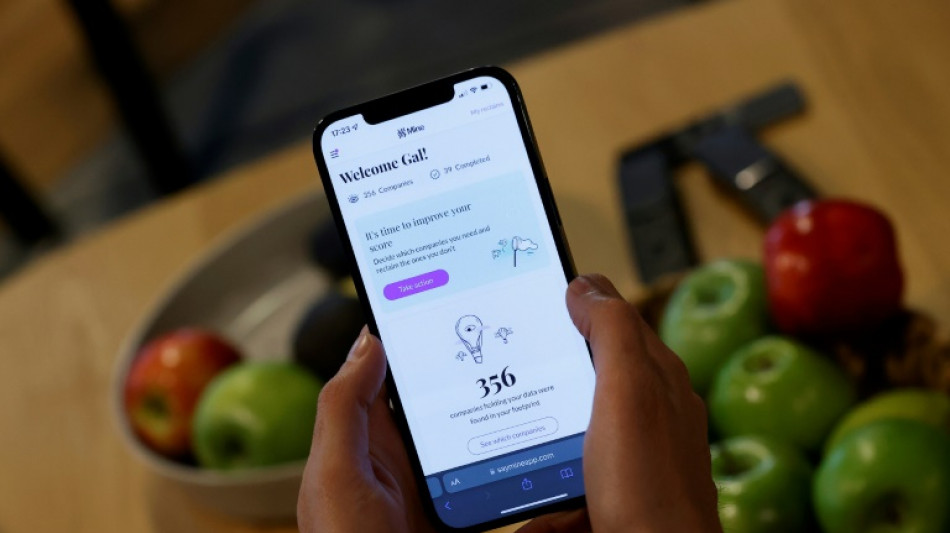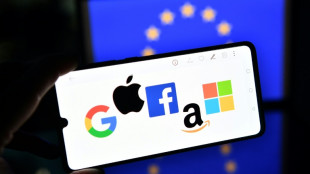
-
 Tokyo logs record 10 days of 35C or more
Tokyo logs record 10 days of 35C or more
-
Sinner, Swiatek romp through at US Open as Gauff struggles

-
 Brazil to face South Korea, Japan in World Cup build-up
Brazil to face South Korea, Japan in World Cup build-up
-
Asian markets diverge with eyes on Nvidia earnings

-
 Osaka out to recapture sparkle at US Open
Osaka out to recapture sparkle at US Open
-
China's rulers push party role before WWII anniversary

-
 Pakistan's monsoon misery: nature's fury, man's mistake
Pakistan's monsoon misery: nature's fury, man's mistake
-
SpaceX answers critics with successful Starship test flight

-
 Nightlife falls silent as Ecuador's narco gangs take charge
Nightlife falls silent as Ecuador's narco gangs take charge
-
Unnamed skeletons? US museum at center of ethical debate

-
 France returns skull of beheaded king to Madagascar
France returns skull of beheaded king to Madagascar
-
SpaceX's Starship megarocket launches on latest test flight

-
 US restaurant chain Cracker Barrel cracks, revives old logo
US restaurant chain Cracker Barrel cracks, revives old logo
-
Brazil's Bolsonaro placed under 24-hour watch ahead of coup trial verdict

-
 Taylor-Travis love story: 5 things to know
Taylor-Travis love story: 5 things to know
-
Sports world congratulates Swift and Kelce on engagement

-
 Wolves inflict more woe on West Ham, Leeds crash out League Cup
Wolves inflict more woe on West Ham, Leeds crash out League Cup
-
Venezuela deploys warships, drones as US destroyers draw near

-
 French political turmoil sends European stocks down, Wall Street edges up
French political turmoil sends European stocks down, Wall Street edges up
-
Sinner, Swiatek romp through at US Open

-
 Meta to back pro-AI candidates in California
Meta to back pro-AI candidates in California
-
Yankees-Giants set for earliest US MLB opener in 2026 schedule

-
 Messi will be game-day decision for Miami in Leagues Cup semis
Messi will be game-day decision for Miami in Leagues Cup semis
-
'Swiftie' Swiatek swats Arango, talks Taylor & Travis engagement

-
 SpaceX set once more for Starship test flight
SpaceX set once more for Starship test flight
-
Sinner begins US Open defence with quick win

-
 Who is Lisa Cook, the Fed governor Trump seeks to fire?
Who is Lisa Cook, the Fed governor Trump seeks to fire?
-
Masters updates qualifying criteria to add six national opens

-
 New era unlocked: Taylor Swift and Travis Kelce announce engagement
New era unlocked: Taylor Swift and Travis Kelce announce engagement
-
Trump to seek death penalty for murders in US capital

-
 Taylor Swift and Travis Kelce announce engagement
Taylor Swift and Travis Kelce announce engagement
-
Swiatek swats Arango, Sinner launches US Open defence

-
 Swiatek swats Arango to reach US Open second round
Swiatek swats Arango to reach US Open second round
-
Tokyo-bound Duplantis, Lyles headline Diamond League finals

-
 Trump joins backlash against US restaurant Cracker Barrel
Trump joins backlash against US restaurant Cracker Barrel
-
US revokes visa of Brazil justice minister in Bolsonaro row

-
 Leverkusen sign former Real Madrid defender Vazquez
Leverkusen sign former Real Madrid defender Vazquez
-
India's Sindhu eyes medal on return to Paris for badminton worlds

-
 British rider Turner wins Vuelta sprint as Gaudu takes race lead
British rider Turner wins Vuelta sprint as Gaudu takes race lead
-
Sci-fi skies: 'Haboob' plunges Phoenix into darkness

-
 Liverpool face Isak dilemma ahead of Arsenal visit to Anfield
Liverpool face Isak dilemma ahead of Arsenal visit to Anfield
-
French political turmoil sends European stocks sliding

-
 Spain calls wildfires one of its worst disasters in years
Spain calls wildfires one of its worst disasters in years
-
Cadillac choose experienced duo Perez and Bottas for F1 debut

-
 Dortmund sign Chukwuemeka from Chelsea until 2030
Dortmund sign Chukwuemeka from Chelsea until 2030
-
EU claims 'sovereign right' to regulate tech after Trump threat

-
 Veterans Perez, Bottas to drive for Cadillac in debut F1 season
Veterans Perez, Bottas to drive for Cadillac in debut F1 season
-
Living in 'sin'? Ronaldo, Rodriguez highlight Saudi double standard

-
 Stocks drop on France turmoil, Trump's Fed firing
Stocks drop on France turmoil, Trump's Fed firing
-
Miyazaki overcomes 'anxiety' to win on badminton worlds debut


'Right to be forgotten': Israel firm promises to purge digital footprint
Three young Israelis formerly serving in military cyber units have figured out how to locate your digital footprint -- and give you the tools to delete it.
The company Mine, co-founded by Gal Ringel, Gal Golan and Kobi Nissan, says it uses artificial intelligence to show users where their information is being stored -- like whether an online shoe store kept your data after a sneaker purchase three years ago.
Ringel said Mine's technology has already been used by one million people worldwide, with over 10 million "right to be forgotten" requests sent to companies using the firm's platform.
Mine launched after the European Union's General Data Protection Regulation (GDPR) -- now an international reference point -- set out key rights for users, including the deletion of personal data that was shared with a site for a limited purpose.
The company's AI technology scans the subject lines of users' emails and flags where data is being stored.
Individuals can then decide which information they want deleted and use Mine's email template to execute their right to be forgotten.
It means they can delete their digital footprint "with a click of a button", Ringel said.
"We're not telling people to not use Facebook or Google. We say: go ahead, enjoy, use whatever you want," he said.
"But as you enjoy using the internet, we'll show you who knows what about you, what they know about you... what is the risk" and how to remove it, he added.
- 'Challenging' -
Last year, hackers broke into the database of Atraf, an Israeli LGBTQ dating website, using the personal information there for extortion.
The year before, Shirbit, a major insurance company, was hacked and troves of data stolen.
Despite those and smaller breaches, Naama Matarasso Karpel from advocacy group Privacy Israel said the public was relatively indifferent.
She also criticised Israel's privacy legislation as inadequate for tackling today's online challenges.
"Privacy is a bit like health or air -- we don't really feel the need for it until we really see how much we lack it," she said.
While public awareness on privacy rights has been slow on the uptake, she said many corporations were realising that better privacy practices made for good business.
"Nobody wants to be caught off-guard," Matarasso Karpel said.
Companies are starting to see privacy "as a value that has to be maintained in order to establish trust with customers", she added.
Mine's co-founder Ringel said companies had contacted his firm for help with the "challenging and cumbersome" process of locating and removing information, in line with the right to be forgotten.
"We help companies to automate that process without any human involvement," he said, reducing their efforts and costs.
But lawyer Omer Tene, co-founder of the Israel Tech Policy Institute, cautioned that deleting specific individual requests was "a complicated technical exercise".
Some companies and organisations cannot legally delete information like blockchains or records of financial interactions needed for tax purposes.
Even information that can be deleted is often kept in varying degrees of identifiability, Tene said.
"All of this nuance makes it difficult to deliver on a promise from both the consumer side and the corporate side, to enable deletion by pressing a button," Tene warned.
N.Fournier--BTB

